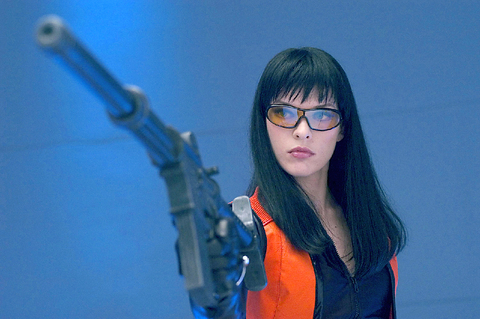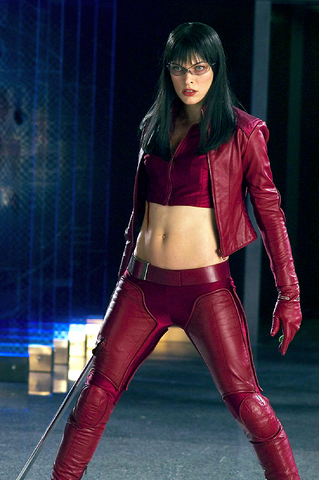Ultraviolet is a race against time that feels like a slow, stumbling death march to the end credits.
A frenetic battle between vampires and humans, it is set in a future where holograms are indistinguishable from real people, gravity can be neutralized and auto-matic weapons materialize out of thin air. But some things remain the same: The ideal attire for samurai swordfights is a skintight, midriff-baring catsuit; villains chuckle maniacally while explaining the details of their doomsday plan to the good guy, and henchmen politely attack the heroine one or two at a time.
"I was born into a world you might not understand," intones the film's namesake in the introductory scenes, but it is a place intimately familiar to comic book fans.

PHOTO COURTESY OF BVI
Ultraviolet is played by Milla Jovovich, whose perfectly toned abs get as much screen time as her face, and do more of the acting. The character began life as a mere human, but became a courier/assassin for the persecuted vampire minority after a virus turned her and many others thirsty.
It's not clear why humans can't coexist with the vampires. These vampires don't suck neck or hiss at crucifixes. Their main offense is dressing like Eurotrash and strutting around as if they were on Planet Catwalk. Still, a totalitarian government is dedicated to wiping them out. Its latest strategy involves a human bio-weapon named Six, whose blood has been altered in a way that makes it deadly to vampires, or to humans, depending on whose version of the confusing narrative you believe.
Both sides want him dead, and there's a self-destruct time bomb ticking inside him. Ultraviolet's maternal instincts flare at his plight and she kills approximately 19,000 extras to keep Six safe. She also finds time to take the lad to a park and spin him on a merry-go-round. That's no way to hide the most hunted person on Earth, but if you're going to buy into vampires and levitation, why quibble?

PHOTO COURTESY OF BVI
Writer/director Kurt Wimmer paints his sci-fi world in garish lollipop hues and the flattest, ugliest, most mediocre CGI graphics this side of Tron. Most of the action scenes are acrobatic exercises in computer mathematics that are both literally and figuratively by-the-numbers. It's maddeningly repetitive and dull.
Only when a brazenly nutty detail is tossed in does our interest spark. One troop of robot warriors smashes to smithereens against Ultraviolet's samurai blade like porcelain Hummel figures. This is a flagrant violation of everything we know about killer-robot design, but it looks sort of interesting. And while watching Ultraviolet, "sort of interesting" is a level of excitement you're grateful to achieve.

June 2 to June 8 Taiwan’s woodcutters believe that if they see even one speck of red in their cooked rice, no matter how small, an accident is going to happen. Peng Chin-tian (彭錦田) swears that this has proven to be true at every stop during his decades-long career in the logging industry. Along with mining, timber harvesting was once considered the most dangerous profession in Taiwan. Not only were mishaps common during all stages of processing, it was difficult to transport the injured to get medical treatment. Many died during the arduous journey. Peng recounts some of his accidents in

“Why does Taiwan identity decline?”a group of researchers lead by University of Nevada political scientist Austin Wang (王宏恩) asked in a recent paper. After all, it is not difficult to explain the rise in Taiwanese identity after the early 1990s. But no model predicted its decline during the 2016-2018 period, they say. After testing various alternative explanations, Wang et al argue that the fall-off in Taiwanese identity during that period is related to voter hedging based on the performance of the Democratic Progressive Party (DPP). Since the DPP is perceived as the guardian of Taiwan identity, when it performs well,

The Taiwan People’s Party (TPP) on May 18 held a rally in Taichung to mark the anniversary of President William Lai’s (賴清德) inauguration on May 20. The title of the rally could be loosely translated to “May 18 recall fraudulent goods” (518退貨ㄌㄨㄚˋ!). Unlike in English, where the terms are the same, “recall” (退貨) in this context refers to product recalls due to damaged, defective or fraudulent merchandise, not the political recalls (罷免) currently dominating the headlines. I attended the rally to determine if the impression was correct that the TPP under party Chairman Huang Kuo-Chang (黃國昌) had little of a

At Computex 2025, Nvidia CEO Jensen Huang (黃仁勳) urged the government to subsidize AI. “All schools in Taiwan must integrate AI into their curricula,” he declared. A few months earlier, he said, “If I were a student today, I’d immediately start using tools like ChatGPT, Gemini Pro and Grok to learn, write and accelerate my thinking.” Huang sees the AI-bullet train leaving the station. And as one of its drivers, he’s worried about youth not getting on board — bad for their careers, and bad for his workforce. As a semiconductor supply-chain powerhouse and AI hub wannabe, Taiwan is seeing